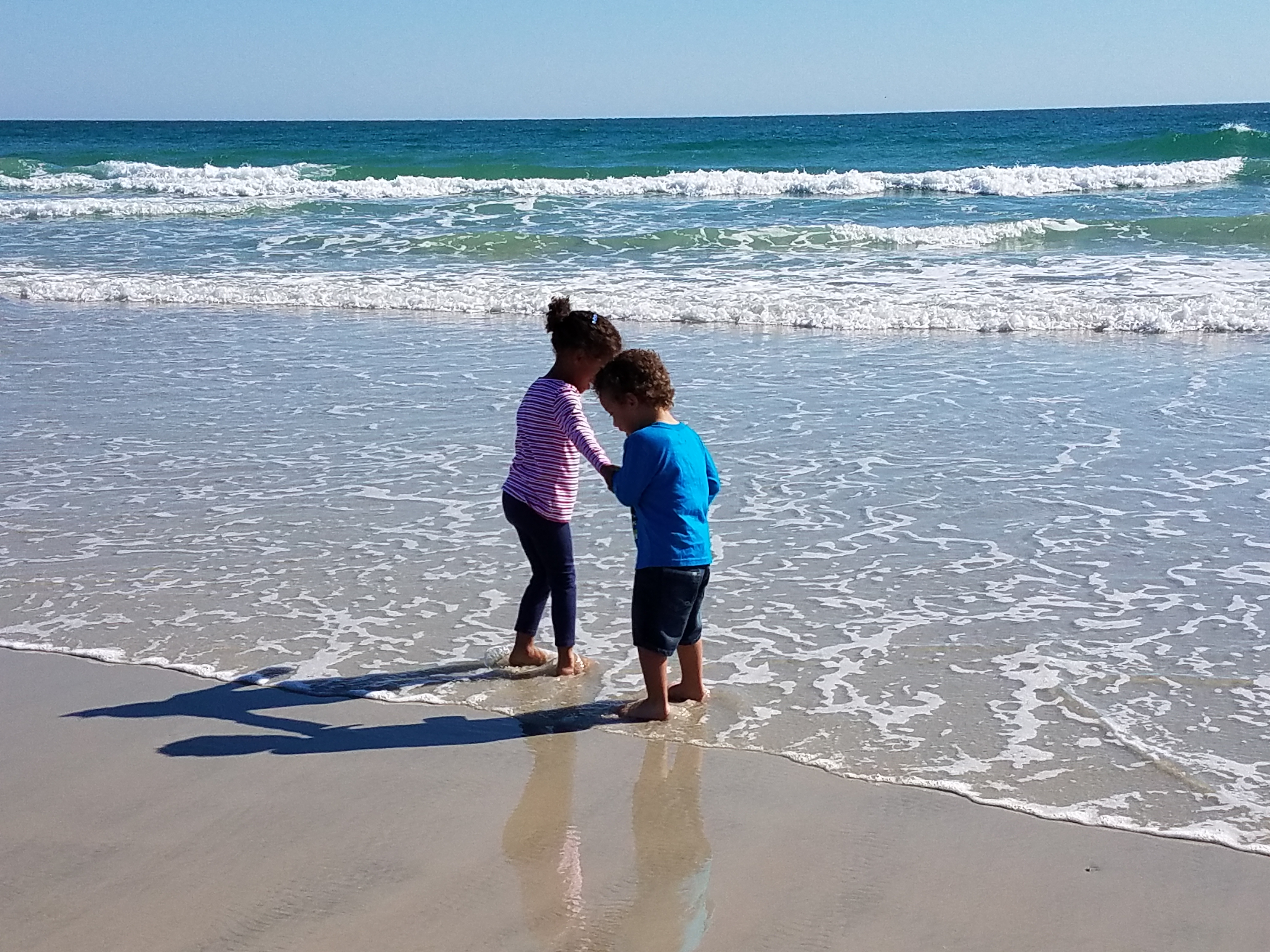As you know, I adopted my children from foster care in 2016, but a lot of you don’t know about our journey. I began fostering them in March of 2014. At the time my daughter was just shy of 2 years old and was only 19 pounds. The doctors said that she was Failure to Thrive(FTV), but after seeing her eat I thought maybe she was just malnourished. I quickly began feeding her smoothies on a regular basis. I made them with yogurt, fresh fruit and Pediasure. I wanted to give her a fighting chance and show the doctors that it might not be FTV. While she was malnourished to the point that her hair was falling out, my son seemed to be healthy for the most part. After a couple of weeks, things started to come together. She was gaining weight, and he was starting to crawl and pull himself up but one thing still bugged me. He would cry and cry when I wasn’t holding him, and then when I held him he cried as if he didn’t want me to touch him. This went on for a couple of weeks with me thinking that it was some sort of withdrawal symptoms. After a couple of weeks, the mama bear kicked in and I realized that something wasn’t right so I started looking into reasons why this might be happening. One of the other odd things that he did would happen when we were riding in the car. If we came to a stoplight, he would start fussing, crying and or screaming. Then as soon as we started moving again it would stop. Not knowing exactly what I was looking for, I somehow stumbled upon Sensory Processing Disorder(SPD). I knew immediately that this is what we were dealing with so I started looking at options for dealing with it and stumbled onto a reference to weighted blankets. I ordered him a weighted blanket from Etsy and while it was rather expensive, I took a chance with the hopes that it would work. The first time I laid that blanket on him, I could just see his body relax. It was pretty amazing and worth every penny. When he was 2, we started seeing more problems mostly with eating, but also with clothing and noise. I haven’t figured it out but for whatever reason noises seem to bother him more now than they did when he was younger. He holds his hands over his ears any time that he hears a loud noise, most specifically a loud, CONSTANT or reverberating noise. He is currently 3 and now we are starting to see some of the behavioral issues that go along with SPD. For example, this weekend we were shopping with a friend and he became completely inconsolable and caused a huge scene in the middle of a store. I always thought, “That will never be my kid”…. Well, guess what it happens and it happens more often than I like. It was SO embarrassing and I felt terrible for my friend because I know she wasn’t prepared for that.
Another example happened today. We were in the car headed to Daytona Beach for a Mother’s Day lunch and he started yelling out and getting fussy. When I say yelling out, he makes extremely loud inappropriate noises. It’s almost like he’s trying to get our attention. He did this in a parking lot the other day to strangers and they didn’t like it at all. When he did it yesterday I decided to hold his hand for a little while and guess what…He stopped. Just the simple rubbing and squeezing of his hand was enough to have him change his course of action and focus on something else. He began to rub my hand and fingers; feeling all of the lines, nails, and then all the way up my arm.
I love my kids more than life itself, but sometimes he is just so hard to deal with and it makes me sad because I know it’s not who he is. I have had him evaluated and they have confirmed that he does indeed have SPD. They recommended occupational therapy but at the time, I wasn’t in a place where I could take off work to get it done. My situation has somewhat changed now, so I’m getting him started in a program as soon as possible. I am also quite certain that my daughter has it as well, just not to the extent that he does.

You might ask…
What is Sensory Processing Disorder (SPD)?
Sensory processing (originally called “sensory integration dysfunction” or SID) refers to the way the nervous system receives messages from the senses and turns them into appropriate motor and behavioral responses. A person with SPD finds it difficult to process and act upon information received through the senses, which creates challenges in performing countless everyday tasks. Motor clumsiness, behavioral problems, anxiety, depression, school failure, and many other problems may impact those who do not have effective treatment.* A complete list of symptoms can be found here.
How does it affect children? Sensory Processing Disorder can affect people in only one sense–for example, just touch or just sight or just movement–or in multiple senses. One person with SPD may over-respond to touch sensation and find clothing, physical contact, other tactile sensory input to be unbearable and/or they may respond to visual or auditory or another sensory input. Another person might under-respond and show little or no reaction to stimulation, even pain or extreme hot and cold or just may be slow to respond to sensation. In children whose sensory processing of messages from the muscles and joints is impaired, posture and motor skills can be affected. These children have postural disorder and are the “floppy” children who prop themselves up on walls when standing, lean over on their hand when writing and love to hang out, but not to move. The old fashioned “couch potato” now turned “mouse potato” as society becomes 2-dimensional (auditory and visual) with I-Pads, I-watches and I-everything! In yet another subtype (dyspraxia) children are awkward and clumsy and get called “klutz” and “spaz” on the playground, always the last to be picked for a team in PE. Still other children exhibit an appetite for sensation that is in perpetual overdrive, we call these children sensory cravers. They seem almost addicted to intense stimulation but when they get they become dysregulated. These kids often are misdiagnosed – and inappropriately medicated – for ADHD.*
What causes SPD?
The causes of SPD are among the subjects that researchers at STAR Institute for Sensory Processing Disorder and their collaborators in the SPD Scientific Work Group have been studying. Preliminary research suggests that SPD is often inherited. If so, the causes of SPD are coded into the child’s genetic material. Prenatal and birth complications have also been implicated, and environmental factors may be involved. For example, children who are adopted often experience SPD, due perhaps to restrictions in their early lives or poor prenatal care. Birth risk factors may also cause SPD (low birth weight, prematurity, etc).*
*All statements and information with an asterisk (*) are from the website for the STAR Institute for Sensory Processing Disorder.
This is the rollercoaster that I have been on for the last 3 years and while some days are EXTREMELY challenging, I wouldn’t trade it for anything. For the most part, my kids are healthy, happy kids who just happen to dance to the beat of their own drums. I do hope that you follow along on our journey.


















It sounds like these 2 kids have a wonderful, loving mom to take care of them. Keep up the great work. 🙂
I think it’s incredible that you brought these children into your life and I’m sure you’ve had bad days but there’s nothing you wouldn’t do for them. Thanks for educating us on SPD.
I have a lot of women in my natural moms group who deal with this! It can be hard but small breakthroughs can be so rewarding! Keep rocking it Mama!! <3
we are just beginning our sensory processing disorder journey now.
I’m so glad you were able to find a weighted blanket that worked and helped your little one. I can’t imagine how difficult it would be to deal with some of these issues. I hope you have a great support system.
This is the first time I have heard of this. I have seen weighted blankets advertised before.
My twins are in OT because they were premature & have sensory issues. Thanks to you, I’m going to read up on SPD.
This is a wonderful story about how your journey began, and the children are lucky to have you, too.
What a blessing that these children have you in their lives now. You’re a wonderful and caring mother!
You are such a wonderful person for all that you have done!! I was not that familiar with the disorder until now.